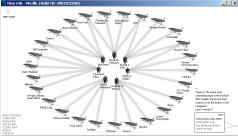They Rule is a launchpad for investigating corporate power relationships in the United States. The website allows users to browse through a variety of maps that function as directories to companies such as Pepsi, Coca-Cola, and Microsoft. They Rule depicts the connections between companies through diagrams of their power structures, specifically their boards of directors. (from the Whitney site)
This is Josh On’s “They Rule” site currently featured at the Whitney Museum in New York. I’ve been discussing this work with josh over the years and I think it is a really important site. I think it reveals firstly the corporate power relationships, the power of sociometry, and most of all the power of the net in being able to mediate global networks of this kind. How else could this sociometric exploration be used? How could it reveal and organise and network the power of the opposition to the rulers? Great that it is recognised by the art world. It is truly art in the service of… (see earlier post with Hillman interview.)
Go Josh!


